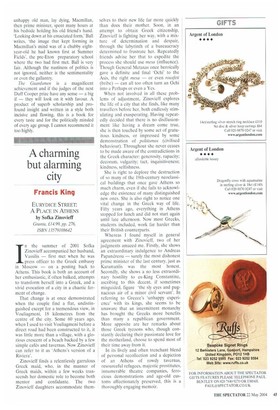A charming but alarming city
Francis King
EURYDICE STREET: A PLACE IN ATHENS by Sofa Zinovieff Granta, Li 4.99, pp. 276, ISBN 13579108642 In the summer of 2001 Sofka Zinovieff accompanied her husband, Vassilis — first met when he was press officer to the Greek embassy in Moscow — on a posting back to Athens. This book is both an account of her enthusiastic, if often balked, attempts to transform herself into a Greek, and a vivid evocation of a city in a chaotic ferment of change.
That change is at once demonstrated when the couple find a flat, undistinguished except for a tremendous view, in Vouliagmeni, 18 kilometres from the centre of the city. Some 60 years ago, when I used to visit Vouliagmeni before a direct road had been constructed to it, it was little more than a village, with a glorious crescent of a beach backed by a few simple cafés and tavernas. Now Zinovieff can refer to it as 'Athens's version of a Riviera'.
Zinovieff finds a relentlessly garrulous Greek maid, who, in the manner of Greek maids, within a few weeks transcends her domestic role to become both mentor and confidante. The two Zinovieff daughters accommodate them selves to their new life far more quickly than does their mother. Soon, in an attempt to obtain Greek citizenship, Zinovieff is fighting her way, with a mixture of determination and despair, through the labyrinth of a bureaucracy determined to frustrate her. Repeatedly friends advise her that to expedite the process she should use mesa (influence). Though General Metaxas once heroically gave a definite and final 'Ochi' to the Axis, the right mesa — or even rousfeti (bribe) — can all too often turn an Ochi into a Perhaps or even a Yes. When not involved in all these problems of adjustment, Zinovieff explores the life of a city that she finds, like many travellers before her, both endlessly stimulating and exasperating. Having repeatedly decided that there is no disillusionment like having a dream come true, she is then touched by some act of gratuitous kindness, or impressed by some demonstration of politismos (civilised behaviour). Throughout she never ceases to be made aware of the contradictions in the Greek character: generosity, rapacity; decorum, vulgarity; tact, inquisitiveness; kindness, selfishness.
She is right to deplore the destruction of so many of the 19th-century neoclassical buildings that once gave Athens so much charm, even if she fails to acknowledge the existence of many distinguished new ones. She is also right to notice one vital change in the Greek way of life. Fifty years ago, everything in Athens stopped for lunch and did not start again until late afternoon. Now most Greeks, students included, work far harder than their British counterparts.
Whereas I found myself in general agreement with Zinovieff, two of her judgments amazed me. Firstly, she shows an extraordinary indulgence to Andreas Papandreou — surely the most dishonest prime minister of the last century, just as Karamanlis was the most honest. Secondly, she shows a no less extraordinary hostility to ex-King Constantine, ascribing to this decent, if sometimes misguided, figure 'the sly eyes and pugnacious air of a minor civil servant'. In referring to Greece's 'unhappy experience' with its kings, she seems to be unaware that an intermittent monarchy has brought the Greeks more benefits than many a republican government. More apposite are her remarks about those Greek tycoons who, though constantly declaring their passionate love for the motherland, choose to spend most of their time away from it.
In its lively and often trenchant blend of personal recollection and a depiction of an Athens of rowdy tavernas. resourceful refugees, majestic prostitutes, innumerable theatre companies, ferocious demonstrations and age-old customs affectionately preserved, this is a thoroughly engaging memoir.


















































































 Previous page
Previous page